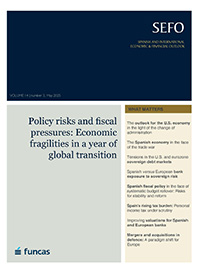Policy risks and fiscal pressures: Economic fragilities in a year of global transition
Fecha: mayo 2025
SEFO, Spanish and International Economic & Financial Outlook, V. 14 N.º 3 (May 2025)
Index
Until the end of last year the U.S. economy was performing better than most other advanced economies, and the prospects were for robust economic growth, moderate inflation and low unemployment; however, the recent policy changes driven by the new administration have generated a significant adverse shock, whose magnitude, if unaddressed, will be amplified both over time and internationally. Within this context of rising uncertainty, the risk of stagflation or worse has increased considerably.
The escalation of U.S. tariffs is weighing on the global economy, with Spain facing limited direct exposure but significant indirect risks. As protectionism deepens and uncertainty persists, exports and investment are expected to slow, thus weakening growth; however, the outlook remains relatively positive.
Transatlantic divergence in fiscal and monetary policies is driving renewed volatility in sovereign bond markets, with U.S. Treasury yields elevated and eurozone spreads widening, particularly in Germany. Going forward, the lack of economic policy coordination could continue to generate episodes of instability in international financial markets.
Spanish banks’ exposure to public debt has increased more sharply than the EU average, reaching 15.4% of total assets in 2024. Amortised cost accounting and international diversification help risk mitigation, while higher interest rates on public debt holdings have significantly boosted returns for the domestic business.
Despite robust growth and a declining headline deficit in 2024, Spain’s underlying fiscal trajectory remains fragile due to persistent structural imbalances and high public debt levels. With the new EU fiscal framework taking effect and long-term spending pressures building, credible consolidation measures are becoming increasingly necessary.
Spain’s tax revenue rose sharply in 2024, led by strong growth in personal income tax, VAT, and corporate income tax. While this helped reduce the public deficit, the non-indexation of PIT has eroded real household incomes and intensified fiscal drag.
After years of trading below book value despite solid fundamentals, Spanish and European banks have seen a marked revaluation since late 2024, surpassing price to book value (P/BV) ratios of 1x. Improved margins have supported a strong recovery in valuations, narrowing the profitability gap with U.S. peers; however, structural and regulatory differences continue to explain the persistent valuation gap between European and U.S. banks.
The defence sector in Europe is experiencing renewed momentum in investment and consolidation, driven by structural challenges, strategic imperatives, and institutional initiatives. While structural and regulatory barriers persist, the sector’s strong fundamentals and strategic relevance are expected to sustain momentum in consolidation and investment going forward.

